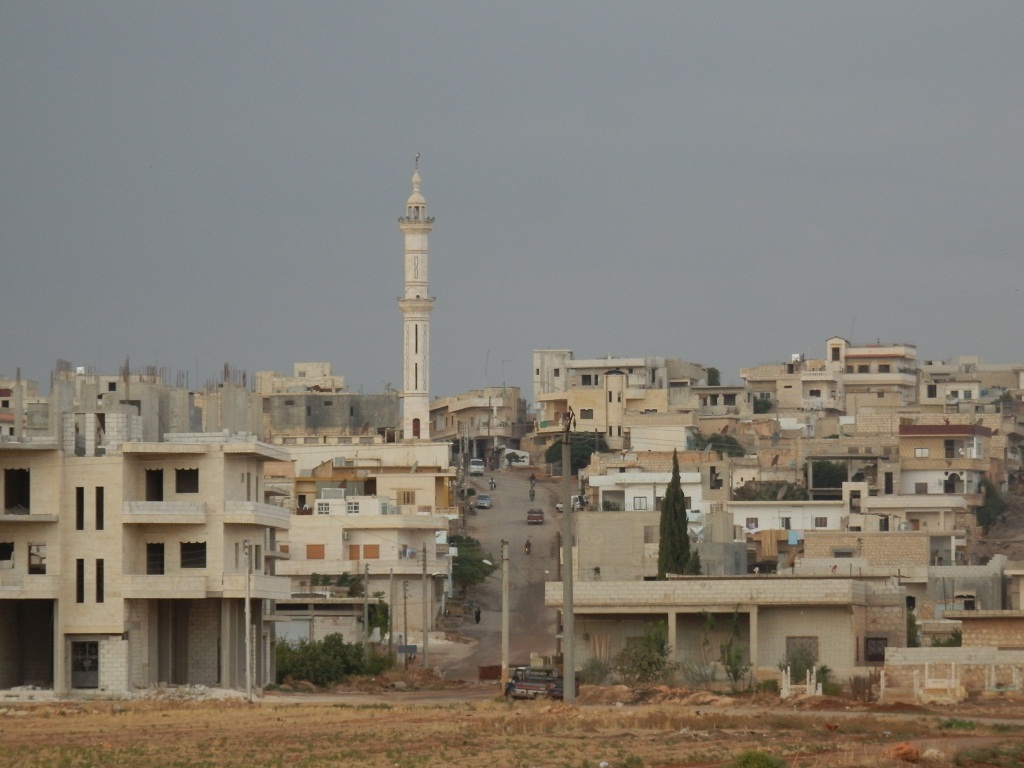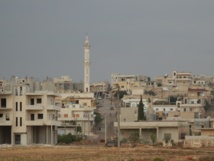The multiple rocket attack on the Furqan and Meridian districts of Aleppo, the country's pre-war commercial capital, also wounded at least 30 people, the Syrian Observatory for Human Rights said.
State television said at least 17 people were killed.
Aleppo has been one of the main battlegrounds of the conflict since rebels seized large swathes of the city in an offensive launched in July last year.
But despite persistent skirmishes between the loyalist and rebel forces, the front lines have changed little in more than a year, reflecting a stalemate across much of war-torn Syria.
The international community has become increasingly alarmed about the potential spillover into neighbouring countries of the war that has killed an estimated 126,000 people since it erupted in March 2011.
Wednesday's rocket attack came as Hezbollah said one of its top leaders was killed near Beirut at a time of soaring sectarian tensions in Lebanon over the conflict in its larger neighbour.
"The Islamic resistance announces the death of one of its leaders, the martyr Hassan Hawlo al-Lakiss, who was assassinated near his house in the Hadath region" east of Beirut, Hezbollah said.
It blamed Israel for the assassination of Lakiss, who was part of the powerful Shiite movement's secretive top leadership.
Israel flatly rejected the allegation.
"Israel has nothing to do with this," foreign ministry spokesman Yigal Palmor told AFP.
Hezbollah openly admitted seven months ago that it is fighting alongside the Syrian army, fuelling sectarian tensions in Lebanon, a country bitterly divided over the war.
The conflict flared nearly three years ago with peaceful pro-democracy protests inspired by the Arab Spring but escalated into a full-scale civil war after President Bashar al-Assad's regime launched a brutal crackdown.
Today, hundreds of armed groups, including powerful jihadist brigades affiliated with Al-Qaeda, are battling both the regime and each other, complicating efforts to reach a political settlement.
Deputy State Department spokeswoman Marie Harf said Washington was engaged with a "broad cross-section of Syrian people and political and military leaders in the opposition, including a variety of Islamist groups" ahead of a US- and Russian-backed peace conference planned for January.
Harf said the contacts were "in response to a reality that the opposition is made up of a number of groups, some are Islamist groups, and that in order to get a political solution here, because there is no military solution, we need to get these groups to buy into the notion that there should be a (political) solution."
The planned peace conference in Geneva is envisioned as a follow-up to a previous meeting in the Swiss city in June 2012, at which the government and the opposition agreed on the formation of a transitional government without specifying what role, if any, Assad would have in it.
Information Minister Omran al-Zohbi insisted on Wednesday that Assad would remain president and lead any transition agreed at the Geneva talks.
"If anyone thinks we are going to Geneva 2 to hand the keys to Damascus over, they might as well not go," he said in remarks carried by the official SANA news agency.
Any role for Assad is anathema to the opposition.
Meanwhile, a Syrian government daily accused rebels of kidnapping a dozen nuns from a convent in the Christian town of Maalula, north of Damascus, to use them as "human shields."
The rebels took the Syrian and Lebanese nuns to a nearby area under their control after capturing the historic town on Monday, in a case that prompted Pope Francis to call Wednesday for prayers for them and others kidnapped in the conflict.
In a joint statement with the opposition National Coalition, the mainstream rebel Free Syrian Army denied any involvement by its fighters in the nuns' abduction.
"We are doing all we can to get them taken to somewhere safe from fire by regime militia," the statement said.
The Observatory said Al-Qaeda loyalists of Al-Nusra Front were holding the nuns, but said activists on the ground reported that they had "suffered no physical harm."
----------------------------------------------------------------------------------------------------
State television said at least 17 people were killed.
Aleppo has been one of the main battlegrounds of the conflict since rebels seized large swathes of the city in an offensive launched in July last year.
But despite persistent skirmishes between the loyalist and rebel forces, the front lines have changed little in more than a year, reflecting a stalemate across much of war-torn Syria.
The international community has become increasingly alarmed about the potential spillover into neighbouring countries of the war that has killed an estimated 126,000 people since it erupted in March 2011.
Wednesday's rocket attack came as Hezbollah said one of its top leaders was killed near Beirut at a time of soaring sectarian tensions in Lebanon over the conflict in its larger neighbour.
"The Islamic resistance announces the death of one of its leaders, the martyr Hassan Hawlo al-Lakiss, who was assassinated near his house in the Hadath region" east of Beirut, Hezbollah said.
It blamed Israel for the assassination of Lakiss, who was part of the powerful Shiite movement's secretive top leadership.
Israel flatly rejected the allegation.
"Israel has nothing to do with this," foreign ministry spokesman Yigal Palmor told AFP.
Hezbollah openly admitted seven months ago that it is fighting alongside the Syrian army, fuelling sectarian tensions in Lebanon, a country bitterly divided over the war.
The conflict flared nearly three years ago with peaceful pro-democracy protests inspired by the Arab Spring but escalated into a full-scale civil war after President Bashar al-Assad's regime launched a brutal crackdown.
Today, hundreds of armed groups, including powerful jihadist brigades affiliated with Al-Qaeda, are battling both the regime and each other, complicating efforts to reach a political settlement.
Deputy State Department spokeswoman Marie Harf said Washington was engaged with a "broad cross-section of Syrian people and political and military leaders in the opposition, including a variety of Islamist groups" ahead of a US- and Russian-backed peace conference planned for January.
Harf said the contacts were "in response to a reality that the opposition is made up of a number of groups, some are Islamist groups, and that in order to get a political solution here, because there is no military solution, we need to get these groups to buy into the notion that there should be a (political) solution."
The planned peace conference in Geneva is envisioned as a follow-up to a previous meeting in the Swiss city in June 2012, at which the government and the opposition agreed on the formation of a transitional government without specifying what role, if any, Assad would have in it.
Information Minister Omran al-Zohbi insisted on Wednesday that Assad would remain president and lead any transition agreed at the Geneva talks.
"If anyone thinks we are going to Geneva 2 to hand the keys to Damascus over, they might as well not go," he said in remarks carried by the official SANA news agency.
Any role for Assad is anathema to the opposition.
Meanwhile, a Syrian government daily accused rebels of kidnapping a dozen nuns from a convent in the Christian town of Maalula, north of Damascus, to use them as "human shields."
The rebels took the Syrian and Lebanese nuns to a nearby area under their control after capturing the historic town on Monday, in a case that prompted Pope Francis to call Wednesday for prayers for them and others kidnapped in the conflict.
In a joint statement with the opposition National Coalition, the mainstream rebel Free Syrian Army denied any involvement by its fighters in the nuns' abduction.
"We are doing all we can to get them taken to somewhere safe from fire by regime militia," the statement said.
The Observatory said Al-Qaeda loyalists of Al-Nusra Front were holding the nuns, but said activists on the ground reported that they had "suffered no physical harm."
----------------------------------------------------------------------------------------------------









 Home
Home Politics
Politics











